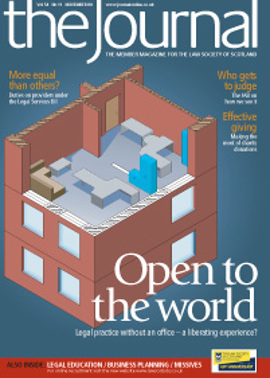Needs of the family
There will be much commentary on all aspects of the long awaited report of Lord Gill’s Review of the Scottish Civil Courts. However, as a family law practitioner I will focus on the potential impact of the report on family actions.
There are two recommendations which, if implemented, could dramatically alter the landscape of family actions at sheriff court level: the introduction of specialised sheriffs, and the creation of the district judge.
The report recommends (para 4.64) that “a number” of sheriffs in each sheriffdom should be designated as specialists. A docket system would enable the same sheriff to deal with a case until resolution (paras 5.44-5.45). In principle, these are welcome proposals. Family law is itself a specialism governed by an intricate set of principles set out in legislation. Difficulties may arise where sheriffs with no particular background in matrimonial cases are called on to preside over a complex family law matter. Specialised sheriffs already sit in the family court in Glasgow, which has been largely hailed as a success.
However, it will be clear that there are issues in relation to the practicality of these recommendations. How many specialised sheriffs will there be in each sheriffdom? In which courts will they sit?
A key aim of the report is to address the problem of delays in the sheriff court. However, unless adequate budget is provided to ensure a sufficient number of specialist sheriffs to make the system work, we may see little change.
One of the more radical recommendations is the creation of the new position of district judge. The rationale is to relieve the pressure on sheriffs: district judges would deal with summary crime, housing actions, and lower value actions for payment. It is also proposed, however, that they have concurrent jurisdiction with sheriffs in family actions. The report comments that this would afford the parties in a family action a choice between the expertise of a designated specialist sheriff or the access to “local justice” provided by a district judge.
The focus on improving the efficiency of the delivery of court business is to be commended. However, on a more detailed look at the implications for family actions, alarm bells begin to ring.
I was struck by the contradictions within the commentary.
First, it is recommended that the jurisdiction of district judges should be limited to actions for payment with a value of £5,000 or less, whilst simultaneously it is deemed appropriate for them to deal with family actions of any value.
Second, is the problematic statement that “it should be possible for some district judges… to develop a special interest in housing… or family law. The fact that such cases will form a significant part of the district judge’s workload will in any event lead to the development of expertise” (paras 5.162-5.163).
This too is contradictory. If district judges are to have the primary purpose of lightening the load for sheriffs by dealing with procedural matters and summary crime, then it is simplistic to suggest that they can also readily develop a “special interest”, and provide the expertise that a specialist sheriff will have. Some district judges may achieve this. However, not all will, which could lead to a two tier system of justice in family cases with an increase in the number of appeals (which at present are infrequent).
The comments regarding child related actions are a further concern. The report envisages (para 4.199) that most actions relating to contact and residence would be dealt with by district judges. The underlying assumption is that cases relating to children may require less expertise. Practitioners know this is not the case. If such issues have reached court they will often be fraught, and sometimes complex – particularly in respect of specific issue orders. A sheriff presiding over such a case must try to navigate a path through the subtleties and nuances and inter-party dynamics that can colour the action. He or she will need the insight, interest and expertise to be able to identify such issues, and to be proactive in finding creative and appropriate solutions. All the more reason for specialised sheriffs with proven expertise to deal with child welfare issues.
Who, then, will fill the post of district judge? The report contains vague statements that the post may be attractive to practitioners “taking a break” or nearing retirement (para 4.177). In the writer’s view there is nothing to suggest the post will be attractive to practitioners with a particular interest in family law (particularly if it involves dealing with a high level of criminal business).
These particular recommendations will be the subject of much debate, and opinions within the profession may vary greatly. However, this practitioner’s view is that the proposals could mean “one step forward, two steps back” for family actions in the sheriff court.
Anna Forsyth is a senior solicitor in the Morton Fraser Family Law Team
In this issue
- The equality, diversity and discrimination agenda: change and challenge ahead
- Justice on the green front
- Let the light in
- Needs of the family
- Reality on the West Bank
- Outside of the box
- Effective philanthropy
- Case for the defence
- Taking on the system
- Same rules for all?
- The benchmark
- Law reform update
- From the Brussels Office
- Appreciation: David Hector MacNeill
- Halfway to the Big Bang
- The same but different
- Five steps forward
- Ask Ash
- Preparing for disaster
- Rules a-changing
- Fair competition
- Time on whose side?
- 40 days and 40 nights
- Hear the grown-ups
- Problems of transition
- Scottish Solicitors' Discipline Tribunal
- Website review
- Book reviews
- Life on the other side
- Never waste a good crisis






